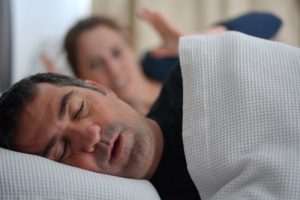Posted on Friday, February 1st, 2019 at 2:13 pm

Despite widespread awareness of this disease, there are people who still remain undiagnosed and unaware that they have this severe condition. If left untreated, sleep apnea is linked to serious health issues, such as high blood pressure, depression, stroke, obesity, cancer, and even diabetes.
There are three main types of sleep apnea, which include:
Obstructive sleep apnea: This is the most common type of sleep apnea. Obstructive sleep apnea occurs when your upper airway is blocked during sleep. This can result in the chest muscles and diaphragm working harder to open the blocked airways to let air go through the lungs. Obstructive sleep apnea can cause irregular heart rhythms as well as reduce the flow of oxygen to vital organs. Most individuals are not aware that this is occurring while they sleep during the night.
Central sleep apnea: Central sleep apnea occurs when the brain cannot send proper signals to the muscles that control breathing. However, central sleep apnea doesn’t cause blockages in the airway. There is a disconnection that happens between the brain and the muscles that control breathing and it causes this particular type of sleep apnea.
Complex sleep apnea: This type is also known as treatment-emergent central sleep apnea. Complex sleep apnea happens when a person has a combination of obstructive sleep apnea and central sleep apnea. A person who previously had OSA develops central sleep apnea because of treatment received and with the constant use of a continuous positive airway pressure (CPAP) device.
Major symptoms of sleep apnea can include loud snoring, dry mouth, headaches, and sleepiness during the day, waking up consistently during the night, and other symptoms.
If you think you have sleep apnea, participating in a sleep study in a lab or at home can show the cause of your sleep disruption. Sleep apnea can be effectively diagnosed, and there are many effective treatment options available. Contact Silent Night Therapy by calling us at 631-983-2463 for more information about treatments.